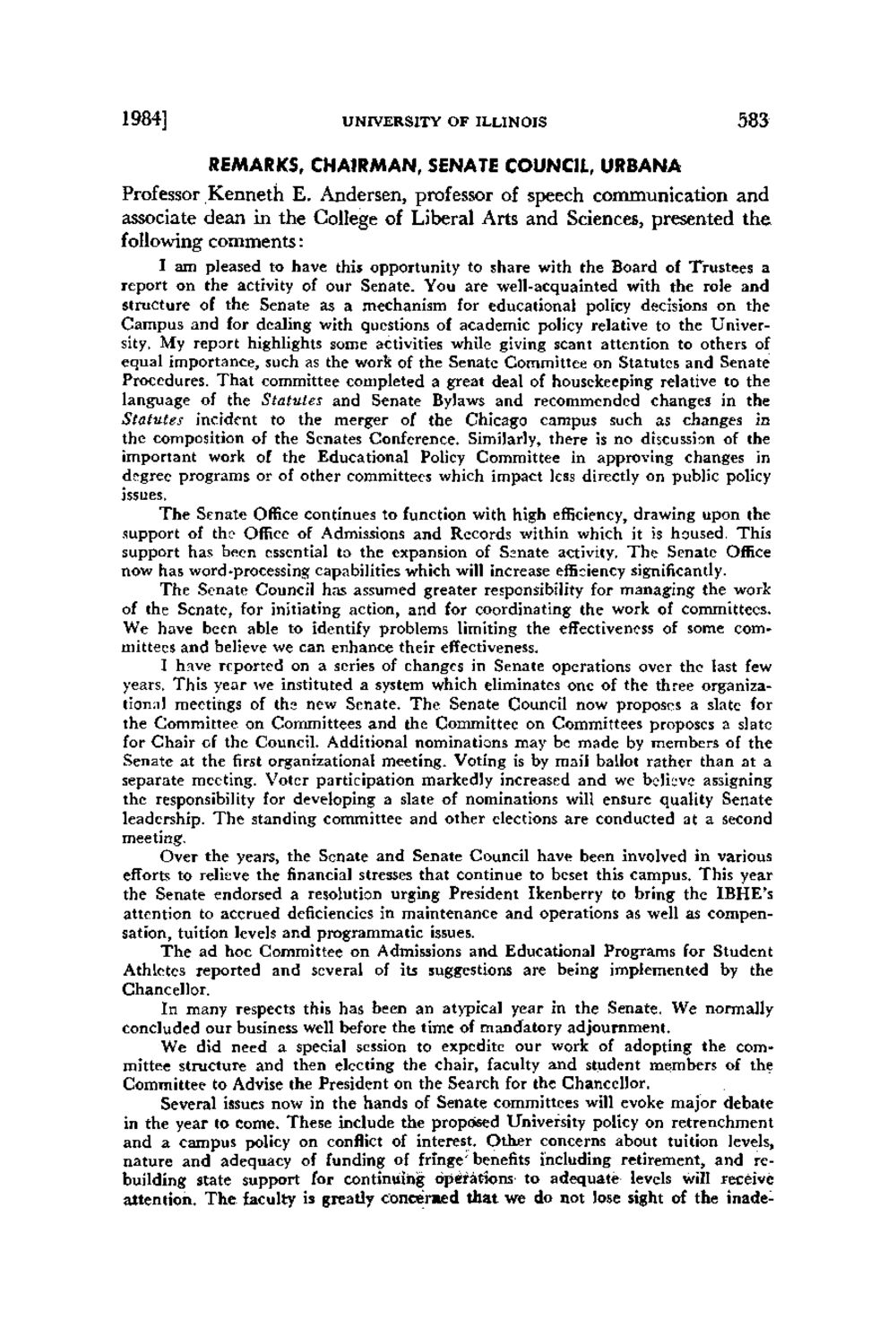| |
| |
Caption: Board of Trustees Minutes - 1984
This is a reduced-resolution page image for fast online browsing.

EXTRACTED TEXT FROM PAGE:
1984] UNIVERSITY OF ILLINOIS 583 REMARKS, CHAIRMAN, SENATE COUNCIL, URBANA Professor Kenneth E. Andersen, professor of speech communication and associate dean in the College of Liberal Arts and Sciences, presented the following comments: I am pleased to have this opportunity to share with the Board of Trustees a report on the activity of our Senate. You are well-acquainted with the role and structure of the Senate as a mechanism for educational policy decisions on the Campus and for dealing with questions of academic policy relative to the University. My report highlights some activities while giving scant attention to others of equal importance, such as the work of the Senate Committee on Statutes and Senate Procedures. That committee completed a great deal of housekeeping relative to the language of the Statutes and Senate Bylaws and recommended changes in the Statutes incident to the merger of the Chicago campus such as changes in the composition of the Senates Conference. Similarly, there is no discussion of the important work of the Educational Policy Committee in approving changes in degree programs or of other committees which impact less directly on public policy issues. The Senate Office continues to function with high efficiency, drawing upon the support of the Office of Admissions and Records within which it is housed. This support has been essential to the expansion of Senate activity. T h e Senate Office now has word-processing capabilities which will increase efficiency significantly. The Senate Council has assumed greater responsibility for managing the work of the Senate, for initiating action, and for coordinating the work of committees. We have been able to identify problems limiting the effectiveness of some committees and believe we can enhance their effectiveness. I have reported on a series of changes in Senate operations over the last few years. This year we instituted a system which eliminates one of the three organizational meetings of the new Senate. The Senate Council now proposes a slate for the Committee on Committees and the Committee on Committees proposes a slate for Chair of the Council. Additional nominations may be made by members of the Senate at the first organizational meeting. Voting is by mail ballot rather than at a separate meeting. Voter participation markedly increased and we believe assigning the responsibility for developing a slate of nominations will ensure quality Senate leadership. T h e standing committee and other elections are conducted at a second meeting. Over the years, the Senate and Senate Council have been involved in various efforts to relieve the financial stresses that continue to beset this campus. This year the Senate endorsed a resolution urging President Ikenberry to bring the IBHE's attention to accrued deficiencies in maintenance and operations as well as compensation, tuition levels and programmatic issues. T h e ad hoc Committee on Admissions and Educational Programs for Student Athletes reported and several of its suggestions are being implemented by the Chancellor. In many respects this has been an atypical year in the Senate. We normally concluded our business well before the time of mandatory adjournment. We did need a special session to expedite our work of adopting the committee structure and then electing the chair, faculty and student members of the Committee to Advise the President on the Search for the Chancellor. Several issues now in the hands of Senate committees will evoke major debate in the year to Come. These include the proposed University policy on retrenchment and a campus policy on conflict of interest. Other concerns about tuition levels, nature and adequacy of funding of fringe' benefits including retirement, and rebuilding state support for continuing operations to adequate levels will receive attention. T h e faculty is greatly concerned that we do not lose sight of the inade-
| |